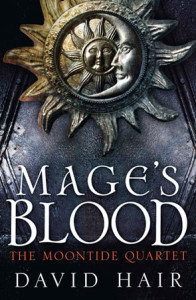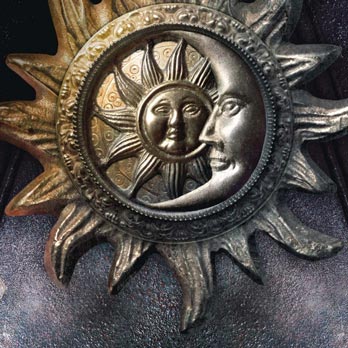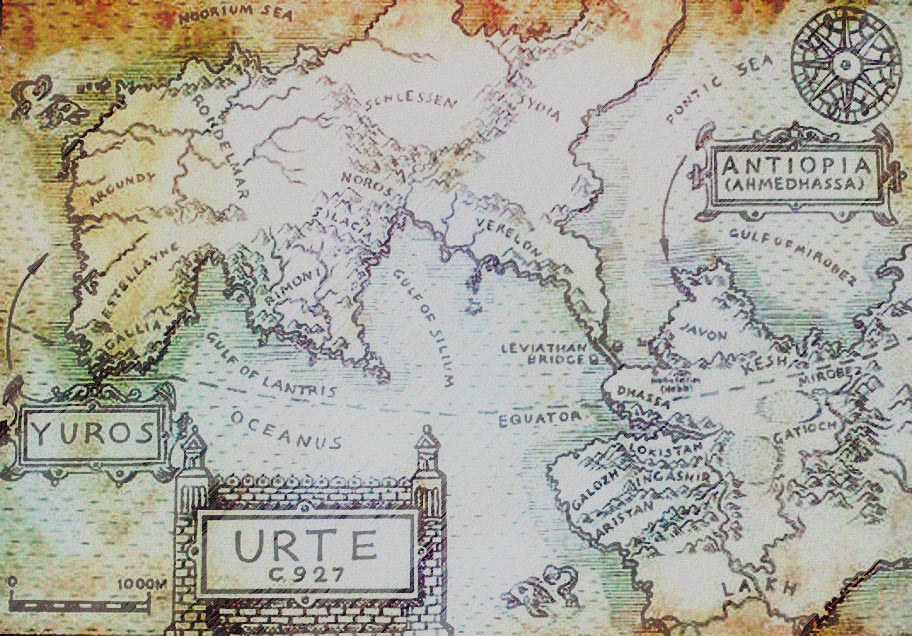
In a fantasy marketplace that has only recently seen a conclusion to Robert Jordan’s iconic Wheel of Time, and long suffering delays to George R.R Martin’s A Song of Ice and Fire, I’ve compiled a list of authors and series I can recommend in their place, which includes: Peter Brett’s Demon Cycle, Elizabeth Bear’s The Eternal Sky, Daniel Abraham’s The Dagger and the Coin, and Brent Weeks’s Lightbringer. That established, David Hair’s first adult novel, Mage’s Blood is one of the better epic fantasy series first instalments I’ve read in recent years.
It should be noted that when I refer to the term epic fantasy, I really mean it. Sweeping conflicts, clashes of cultures, political and personal entanglements, rich and in-depth magic, and mighty warriors dot the landscape. There’s even lavish descriptions of food,
…they ate a cold meal of dried meat and breads, washed down with a small flask of arak and some water, all from the wagon’s spoils. Tanuva Ankesharan’s best cooking could not match so wondrous a feast as this scavenged meal.
Written in limited third person from multiple points of views, Mage’s Blood does maintain some notion of good and evil. It walks a fine line though, often refusing to color individuals entirely one or the other. In that sense it’s quintessential modern epic fantasy, but couched in a very expected setting.
Mage’s Blood re-imagines the East-meets-West collision of Islam and Christianty in the early parts of the 20th Century. Yuros (the west) and Antiopia (the east) are the two continents of Urte, connected only by the Leviathan Bridge, which emerges from the ocean every 12 years when the Moontide ebbs. Built by Magi, the bridge began as a gateway to trade and cultural exchange. Now, the Rondian Empire, founded by some of those same Magi, has made it an accessory to bloodshed. Believing in their manifest destiny, the Empire crusades against the morally inferior heathens. As the narrative begins, Moontide approaches and a third crusade is in the offing.
Mage’s Blood re-imagines the East-meets-West collision of Islam and Christianty in the early parts of the 20th Century.
 Given the tacitly familiar setting, reminiscent of our own history and of R. Scott Bakker’s Prince of Nothing, it becomes imperative that Hair write compelling characters doing interesting things. He centers the narrative around four primary points of view, Alaron and Elena, blood relatives and Magi both, and Ramita and Kazim, common Antiopians caught up in events too large for their experience. All four are well rendered, but only Elena truly stands out as something different from standard archetypes. She’s a capable woman who’s both physical and feminine, albeit irrevocably broken by the life she’s lived.
Given the tacitly familiar setting, reminiscent of our own history and of R. Scott Bakker’s Prince of Nothing, it becomes imperative that Hair write compelling characters doing interesting things. He centers the narrative around four primary points of view, Alaron and Elena, blood relatives and Magi both, and Ramita and Kazim, common Antiopians caught up in events too large for their experience. All four are well rendered, but only Elena truly stands out as something different from standard archetypes. She’s a capable woman who’s both physical and feminine, albeit irrevocably broken by the life she’s lived.
Alaron by comparison is standard is as standard does, a put upon youngster learning magic (called the gnosis) and finding his place in the world. It’s a trope, but one I can’t help loving, no matter how often I read it. Hair executes it well, making Alaron’s tale the one I’m most interested in continuing. Ramita and Kazim fall into a similar trap, exhibiting the reticent broodmare and love spurned barbarian stereotypes. At the outset, the pair are betrothed, but soon find themselves split apart as the crusade precipitates action by powerful forces. Their story line, particularly in the novel’s first half, involves a great deal of travel, necessitating frequent map and name checking to maintain immersion. Mage’s Blood, does a bit of hand waving, which I’ll go into detail about it later, but suffice to say that Hair doesn’t think very far beyond the snapshot in time that contains his narrative. I’m also a little tired of the female character who sleeps around to gain an illusion of power.
Thankfully, Mage’s Blood comes with beautifully illuminated maps, joining the Wheel of Time tradition in printing the map right on the inside cover. Had I been reading the novel electronically I’m certain I would have been frustrated by the need for referencing. In hardcover, it lent the whole experience some nostalgia for the big fat fantasy of my youth. I concede, the map reinforces the notion that here may be an over reliance on naming, undoubtedly to create a sense of wonder in an otherwise vanilla setting, but I’d be hesitant to make the statement without an additional reading.

I remarked earlier about Hair’s hand waving, most apparent when looking at the obligatory Fantasy map. His Bridge, which connects two continents that have been separated for thousands of years, creates cognitive dissonance. It’s a wonderful plot device, but necessitates the question, why do these two societies look so similar? Despite being linked for only a hundred years (give or take), they have very little physical, psychological, or even cultural divergence. Antiopia feels like the Middle East and/or India, and Yuros feels like Europe. For comparison’s sake, it’s like Cortez washing up on the beaches of South America and encountering Turks. It makes Mage’s Blood something of an anthropological boondoggle. I recognize it’s a story, and I won’t dwell on it, but it feels like Hair shoehorned in a plot device consequences be damned.
Hair tells his story with aplomb in a clear and concise prose, [and unveils] twists and turns at the right moment, but never at the expense of his reader.
While I might have preferred that aspect to be better thought out, it’s a tiny detail in the larger whole. Hair tells his story with aplomb in a clear and concise prose that won’t remind anyone of the aforementioned Bakker, although in that same vein it lacks the thematic import of Bakker’s work. Hair doles out information wisely, unveiling his twists and turns at the right moment, but never at the expense of his reader. Earlier, I listed a group of authors to fill the gap between A Song of Ice and Fire novels, David Hair shows enough in Mage’s Blood to put him alongside those others, albeit on a probational status. I’ll be happy to read the second instalment, and hope that by then he’s ready for full fledged approval.


Hmm… The comparison to R. Scott Bakker might have sold me.
Pity its not out until…September here in the States
Who’s publishing it Paul?
According to Amazon, it looks like it’s also being published by Jo Fletcher Books in the States.
Aidan beat me to it, yeah., Jo Fletcher Books
That’s a good point you bring up Justin and Liviu had similarly remarked upon it when we reviewed this title at FBC.
David was also kind enough to clarify this bit in his interview [see Q. 5] with us.
I had heard of neither this series nor the author before reading this post, but from your descriptions, I think I need to pick up a copy of this book when I’m able. I’ve been in a real mood for some good epic fantasy lately, and I love coming across new things that will be able to scratch that itch. I appreciate the recommendation, and now I have yet another book to add to the growing list of books that are going to suck my bank account dry. :p